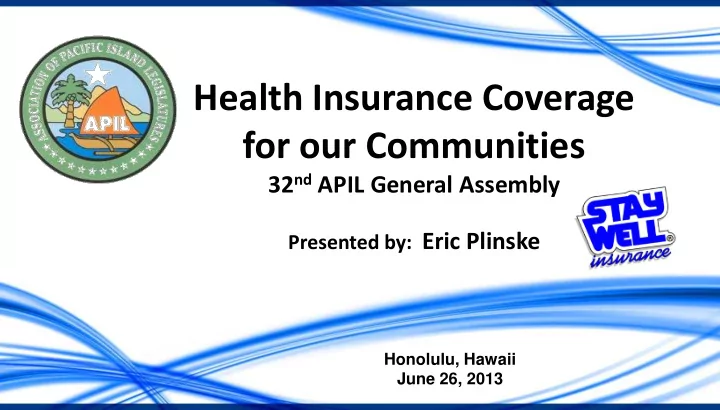

Health Insurance Coverage for our Communities 32 nd APIL General Assembly Presented by: Eric Plinske Honolulu, Hawaii June 26, 2013
Overview • HI, GU, & CNMI Uncompensated Care Dilemma • Review of Four (4) Govt Health Plans in Region • FAS Population & Employment Demographics • Performance of Regional Plans • Regional Health Plan Advantages • Suggestions for Consideration
What is the Regional Healthcare Goal?
The “Blue Continent” Kwajalein Chuuk ( )
Uncompensated Care Dilemma • Emergency Medical Treatment & Active Labor Act (EMTALA) • FAS citizens have not been eligible for Medicaid since 1996 • HI, GU, and NMI governments are absorbing costs of uninsured FAS care • FAS citizens in HI, GU, & NMI could be covered under a FAS regional plan
Restoring Medicaid for Micronesians • Hawaii Senator Mazie K. Hirono • US Senate Immigration bill (S. 744) • If approved, Fed will cover 51.86% in Hawaii and 55% in Guam & CNMI for legal residents from the FAS • Hawaii Medicaid Expansion under Affordable Care Act (ACA) provides 100% Fed coverage through 2019
Micronesians in HI, GU, & CNMI 2010 Census
GMH Micronesian Admissions Calender Year 2012
Four Micronesian Government Plans • FSM – MiCare National Plan • FSM – Chuuk State Health Care Plan • RMI – Health Care Fund • ROP – Health Care Fund
FSM MiCare Health Plan • 1984: Natl Govt Emply’s Health Ins Prog created • 2002: Transferred to board & became MiCare • Five (5) premium-based plan options • Covers up to 4 minor dependent children – Additional premiums for more than 4 children
Chuuk State Health Plan • 1994: Est. by Chuuk Health Care Plan Act of ‘94 • 2003: Commenced operations in Sep’03 – 5 member governing Board of Trustees • 3.0% payroll deduction with employer match • Covers maximum of 5 dependents
RMI Health Care Fund • 2002: Est. by RMI Health Fund Act of 2002 • Two plan options: – Basic plan (98%) & Supplemental Plan (2%) • 3.5% payroll deduction with employer match • Covers spouse & unlimited # of depn children
ROP Health Care Fund • 2010: Est. by National Healthcare Financing Act • Two components: – Medical Savings Account – outpatient care – National Health Insurance – inpatient & referral care • 2.5% payroll deduction with employer match • Covers spouse and unlimited # of depn children
Current Government Plan Challenges • Escalating # of referral cases • High medical referral travel costs • High price for Hawaii care • Increasing prescription medication costs • High administrative costs (redundancy) • Low or stagnant enrollment (in some cases)
Top 5 Causes of Referrals FSM FSM RMI ROP MICARE CSHP HCF HCF Cardiovascular 66 Cases = 170 Orthopedic 30 Cardiovascular 61 Orthopedic 56 Cancer 16 Orthopedic 32 Cancer 37 Ophthalmology 14 Cancer 25 Urology 22 Congenital 14 Neurology 22 Neurology 19 Cardiovascular 12 Other 40
Pacific Island Health Care Project PIHCP at Tripler Army Medical Center • Created in 1989 by Senator Inouye • Outreach care funded by US Army Medical Cmd • Targeted to indigenous US Pacific Islanders • RMI in 2012 – 29 referrals to TAMC out of 120 (24%) – 17 referrals to Shriners’ Hospital out of 120 (14%)
Micronesian Population Trends -4% Combined Population = 173,502 -4% +5% +5% -9%
Micronesia Active Work Force Private & Public Sectors (Excluding Self Employed & Home Production) Total Estimate = 36,410 16% of Population 20% 57% of of Population Population 2011 & 2012 PITI-VITI Economic Reports
Micronesia Average Annual Earnings 2011 & 2012 PITI-VITI Economic Reports
2012 Premiums vs. Claims Industry Average for Medical Loss Ratio (MLR) is 80% MLR 111% Out Patient care not included MLR 89% MLR 55% MLR 73%
Population vs. Plan Membership MiCare + CSHP members = 32% of FSM Population 98 % 19% 88% 29%
2012 Administrative Costs Target should be 10% of Premiums 22% 9% 10% 19%
Regional Plan Financial Performance 2011 2012 2012 2012 RMI HCF FSM MiCare FSM CSHP ROP HCF Premiums $7.192M 100% $5.407M 100% $1.104M 100% $4.516M 100% Expenses: Off Island Care $2.046M 28% $2.593M 48% $0.662M 60% $1.001M 22% On Island Care *$4.971M 69% $2.238M 41% $0.144M 13% $1.376M 31% Off Island Travel $0.610M 9% $0.347M 6% **$0.050M 5% $0.094M 2% Admin Costs $1.593M 22% $0.483M 9% $0.160M 15% $0.452M 10% Total Expenses $9.220M 128% $5.661M 105% $01.016M 93% $2.923M 65% Net Gain / (Loss) ($2.028M) (28%) ($0.254M) (5%) $0.088M 7% $1.594M 35% * RMI did not account for out patient care costs ** CSHP off island travel costs for medical referral may be under reported
Palau Health Care Fund Contributions Benefits Medical Savings Employee Account 2.5% Outpatient Care, Prescription Meds, & NHI Co-pays 5% National Health Insurance Employer Palau Inpatient Care & Approved Medical 2.5% Referral $25K max/case Administrative Expenses
Palau Health Care Fund Co-Payment for Inpatient Treatment National Health Insurance 80% Ceiling: Co-Payment 20% $200 - $400 Depending on income
Palau Health Care Fund Approved Off-Island Referrals National Health Insurance 80% Ceiling: Co-Payment 20% $1,000 - $4,000 Depending on income Annual HH Income Co-pay Ceiling $0 - $5,599 $1,000 $5,600 - $11,199 $2,000 $11,200 - $16,799 $3,000 $16,800 & above $4,000
Regional Health Plan Advantages • More members = greater bargaining power • Unified health plan benefits across region • Pre-authorization & Utilization Management • Pharmacy Benefit Management • Lower administrative costs • Centralized claims adjudication • Technology to improve efficiency & continuity of care • Build local capacity (TMC/GRMC)
The “Blue Continent” TAMC Kwajalein Chuuk ( )
The “Blue Continent” Kwajalein Chuuk ( )
Suggestions for Consideration • Establish a regional health plan • Mandate coverage throughout FSM – Two govt plans should not exist in the FSM • Build on-island capacity with TMC/GRMC • Off island referral option 1: TAMC or Shriners’ • Off island referral option 2: GRMC & TMC
Eric Plinske StayWell Insurance elplinske@staywellguam.com 670-323-4260/1/2
Recommend
More recommend